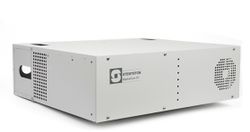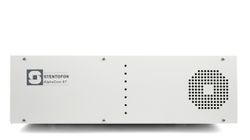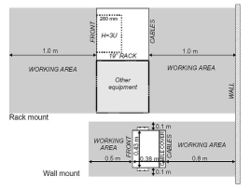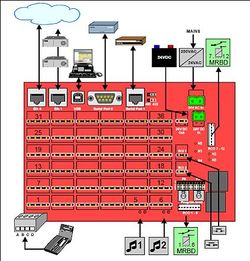AlphaCom E7: Difference between revisions
From Zenitel Wiki
No edit summary |
|||
| (22 intermediate revisions by 4 users not shown) | |||
| Line 1: | Line 1: | ||
[[ | {{obsolete}} | ||
This product is discontinued and replaced by [[AlphaCom XE7]] | |||
See also [[AlphaCom Exchange Upgrade]] | |||
[[Image:9607 RS.jpg|thumb|250px|AlphaCom E7]] | |||
== Features == | == Features == | ||
[[Image:96073 RS.jpg|thumb|250px]] | |||
* Next generation multiservice platform with integrated media processing engine, packet processing engine, HW encryption and storage module | * Next generation multiservice platform with integrated media processing engine, packet processing engine, HW encryption and storage module | ||
* Made for critical communication and security solutions | * Made for critical communication and security solutions | ||
| Line 7: | Line 14: | ||
* Best of both worlds – supports a mix of IP and traditional services within the same node | * Best of both worlds – supports a mix of IP and traditional services within the same node | ||
* Backward compatible | * Backward compatible | ||
* SIP interoperability with VoIP systems and equipment | * [[SIP]] interoperability with VoIP systems and equipment | ||
* Wide range of open interfaces | * Wide range of open interfaces | ||
* Superb audio quality in all environments | * Superb audio quality in all environments | ||
| Line 30: | Line 37: | ||
efficiency, service capabilities and system operation. | efficiency, service capabilities and system operation. | ||
The cabinet has room for installation of 7 circuit boards, one | The cabinet has room for installation of 7 circuit boards, one [[AMC-IP]] | ||
processor board and up to 6 feature boards. The exchange | processor board and up to 6 feature boards. The exchange | ||
also includes a power board and a cooling fan. | also includes a power board and a cooling fan. | ||
Several exchanges can be interconnected on AlphaNet over IP, | Several exchanges can be interconnected on [[AlphaNet]] over IP, | ||
as well as traditional methods, both locally and worldwide. All | as well as traditional methods, both locally and worldwide. All | ||
communication and services are available throughout the entire | communication and services are available throughout the entire | ||
| Line 49: | Line 56: | ||
== Installation == | == Installation == | ||
[[image:AC E7 Installation.jpg|thumb| | [[image:AC E7 Installation.jpg|thumb|250px|]] | ||
The cabinet can be wall or shelf mounted or mounted in a 19” rack. | The cabinet can be wall or shelf mounted or mounted in a 19” rack. | ||
It has room for installation of one [[AMC-IP]] processor board and up | It has room for installation of one [[AMC-IP]] processor board and up | ||
to 6 feature boards. The exchange also includes a power board | to 6 feature boards. The exchange also includes a power board | ||
and a cooling fan. | and a cooling fan. | ||
[[image:AC E7 Connection to AlphaCom E7.jpg|thumb| | [[image:AC E7 Connection to AlphaCom E7.jpg|thumb|250px|Connection to AlphaCom E7 | ||
backplane]] | backplane]] | ||
* All cables are terminated to connectors on the backplane. | * All cables are terminated to connectors on the backplane. | ||
| Line 62: | Line 69: | ||
* The two NO switches on the [[RCI]] connectors can execute programmable functions. | * The two NO switches on the [[RCI]] connectors can execute programmable functions. | ||
* The 12 [[RCO]]’s are connected to optional [[MRBD]] relay boards and can be programmed to execute functions such as door control. | * The 12 [[RCO]]’s are connected to optional [[MRBD]] relay boards and can be programmed to execute functions such as door control. | ||
* Connector 5 and 6 on the first [[ASLT]] line board are enabled for program distribution. Additional programs can also be connected to individual ASLT ports via the interface board [[FBSAR]], 6 programs per board. If line points 5 and/or 6 are to be used as subscriber line points, follow the procedure described | * Connector 5 and 6 on the first [[ASLT]] line board are enabled for program distribution. Additional programs can also be connected to individual ASLT ports via the interface board [[FBSAR]], 6 programs per board. If line points 5 and/or 6 are to be used as subscriber line points, follow the procedure described in "[[Physical number 5 and 6 (AlphaCom E7)]]". | ||
* The exchange is normally powered from the mains via a 24 VAC transformer. The 6 A type 203 0010 260 can serve up to 24 extensions, while the 11 A type 203 0010 270 is needed for a full cabinet of 36 subscribers. | * The exchange is normally powered from the mains via a 24 VAC transformer. The 6 A type 203 0010 260 can serve up to 24 extensions, while the 11 A type 203 0010 270 is needed for a full cabinet of 36 subscribers. | ||
* Battery backup power can be connected to the 24 VDC input plug. | * Battery backup power can be connected to the 24 VDC input plug. | ||
<br style="clear:both;" /> | |||
== Ground connection == | == Ground connection == | ||
| Line 75: | Line 84: | ||
The jumper should normally be in the "DC" position, which connects the cabinet and 0 V together. | The jumper should normally be in the "DC" position, which connects the cabinet and 0 V together. | ||
In some installations, for instance on ships, it is not allowed for the return signal current to float to the chassis. In these installations the jumper must be set in "AC" position | In some installations, for instance on ships, it is not allowed for the return signal current to float to the chassis. In these installations the jumper must be set in "AC" position. | ||
*Jumper DC: Galvanic connection between 0V and the cabinet | *Jumper DC: Galvanic connection between 0V and the cabinet | ||
*Jumper AC: Galvanic isolation between 0V and the cabinet | *Jumper AC: Galvanic isolation between 0V and the cabinet | ||
In order to isolate the 0V from chassis on previous versions of the E7 (and AlphaCom M) cabinet, one has to isolate the whole cabinet using plastic washers. | |||
=== Ground screw === | === Ground screw === | ||
| Line 101: | Line 112: | ||
|'''Humidity range''' || 10% to 90% RH | |'''Humidity range''' || 10% to 90% RH | ||
|- | |- | ||
|'''Connections''': <br | |'''Connections''': <br /> Feature cards <br /> Traditional intercom <br /> Entertainment channels <br /> Remote control inputs <br /> Remote control outputs <br /> Serial port <br /> Serial port <br /> Ethernet | ||
|| <br | || <br /> 6 slot positions <br /> 36 x extensions with 4-wire terminal plug <br /> 2 with level control <br /> 2 x RCI <br /> 12 x RCO <br /> 1 x RS232, 9-pin D-sub <br /> 1x RS232/RS422/RS485, RJ-45 <br /> 2 x 10/100 Mbps, RJ-45 | ||
|- | |- | ||
|- | |- | ||
|'''Traffic capacity''': <br | |'''Traffic capacity''': <br /> SIP trunks <br /> VolP AlphaNet <br /> Digital trunks <br /> Analogue trunks | ||
|| <br | || <br /> 30 channels <br /> 30 channels <br /> 32 channels <br /> 6 channels | ||
|- | |- | ||
|'''IP protocols''' <br | |'''IP protocols''' <br /><br /> || IP v4 - TCP - UDP - Telnet - FTP - NTP <br /> HTTP 1.1 - Syslog - SNMP v2c - SIP - RTP - <br /> RTCP - VolP AlphaNet - STENTOFON data | ||
|- | |- | ||
|'''Audio technology''' <br | |'''Audio technology''' <br /><br /><br /> || High-Resolution 1-Bit Audio - High-Fidelity <br /> 40 Hz - 18.5 kHz - Wideband 7 kHz (G.722) <br /> - Narrowband 3.4 kHz (G.711) - Adaptive <br /> Jitter Buffers - Adaptive Time Synchronization | ||
|- | |- | ||
|'''EMC''' <br | |'''EMC''' <br /> || Emission: IEC 61000-6-3, IEC 61000-6-4 <br /> Immunity: IEC 61000-6-1, IEC 61000-6-2 | ||
|- | |- | ||
|'''Compliance''' || CE, EN, 60950 | |'''Compliance''' || CE, EN, 60950 | ||
|- | |- | ||
|} | |} | ||
[[Category: | |||
[[Category:Discontinued Servers]] | |||
Latest revision as of 13:32, 14 June 2018
This product is discontinued and replaced by AlphaCom XE7
See also AlphaCom Exchange Upgrade
Features
- Next generation multiservice platform with integrated media processing engine, packet processing engine, HW encryption and storage module
- Made for critical communication and security solutions
- Embedded real time Linux operating system
- Best of both worlds – supports a mix of IP and traditional services within the same node
- Backward compatible
- SIP interoperability with VoIP systems and equipment
- Wide range of open interfaces
- Superb audio quality in all environments
- New services through Web i.e. remote programming
- Networking capabilities to extend your solution geographically
Description
The AlphaCom E combines the best of the present advanced AlphaCom system with the latest IP, Linux and embedded networking technologies. When entering the IP world, no compromise has been made. The AlphaCom E provides the complete set of existing services, quality, reliability and security characteristics for which AlphaCom has always been recognized.
Some of the special features it brings into the IP domain are wideband (7 kHz) audio, a built-in firewall, integrated Web and SIP server, hardware encryption and low latency switching.
In addition to these important characteristics, a new set of innovative services has been introduced to improve cost efficiency, service capabilities and system operation.
The cabinet has room for installation of 7 circuit boards, one AMC-IP processor board and up to 6 feature boards. The exchange also includes a power board and a cooling fan.
Several exchanges can be interconnected on AlphaNet over IP, as well as traditional methods, both locally and worldwide. All communication and services are available throughout the entire network.
The AlphaCom E-series includes extended integration of different kinds of communication and alarm systems, access control, CCTV, public address, public telephones and a variety of features and solutions that can be added when desired. It is easy to interface to 3rd party systems to create special applications.
The new technology allows remote programming, logging and maintenance via AlphaPro, Syslog and standard web browsers.
Installation
The cabinet can be wall or shelf mounted or mounted in a 19” rack. It has room for installation of one AMC-IP processor board and up to 6 feature boards. The exchange also includes a power board and a cooling fan.
- All cables are terminated to connectors on the backplane.
- The two-pair star wired intercom cables are connected using pluggable screw connectors.
- Two RJ45 Ethernet terminals are used for IP LAN, WAN, internet and AlphaNet IP communication.
- The serial ports with RS232 and RS422/485 interface are used for interface to equipment using these protocols.
- The two NO switches on the RCI connectors can execute programmable functions.
- The 12 RCO’s are connected to optional MRBD relay boards and can be programmed to execute functions such as door control.
- Connector 5 and 6 on the first ASLT line board are enabled for program distribution. Additional programs can also be connected to individual ASLT ports via the interface board FBSAR, 6 programs per board. If line points 5 and/or 6 are to be used as subscriber line points, follow the procedure described in "Physical number 5 and 6 (AlphaCom E7)".
- The exchange is normally powered from the mains via a 24 VAC transformer. The 6 A type 203 0010 260 can serve up to 24 extensions, while the 11 A type 203 0010 270 is needed for a full cabinet of 36 subscribers.
- Battery backup power can be connected to the 24 VDC input plug.
Ground connection
As from fall 2007 the E7 cabinet is equipped with a jumper which makes it possible to isolate the system ground (0V) from the chassis.
Jumper AC/DC
The jumper makes it possible to get galvanic isolation between the cabinet and the internal ground (0 V). The jumper should normally be in the "DC" position, which connects the cabinet and 0 V together.
In some installations, for instance on ships, it is not allowed for the return signal current to float to the chassis. In these installations the jumper must be set in "AC" position.
- Jumper DC: Galvanic connection between 0V and the cabinet
- Jumper AC: Galvanic isolation between 0V and the cabinet
In order to isolate the 0V from chassis on previous versions of the E7 (and AlphaCom M) cabinet, one has to isolate the whole cabinet using plastic washers.
Ground screw
The ground screw is connected to the cabinet, regardless of the jumper setting, and is used to connect the cabinet to protective ground.
Technical Specification
| Dimensions (WxHxD) | 427 x 133 x 380 mm |
| Weight | 7 kg |
| Mounting | Wall, shelf or 19" rack |
| Power | 24 V AC or DC, 260 W max. |
| Temperature | 0 to +35'C / +32 to +95'F |
| Humidity range | 10% to 90% RH |
| Connections: Feature cards Traditional intercom Entertainment channels Remote control inputs Remote control outputs Serial port Serial port Ethernet |
6 slot positions 36 x extensions with 4-wire terminal plug 2 with level control 2 x RCI 12 x RCO 1 x RS232, 9-pin D-sub 1x RS232/RS422/RS485, RJ-45 2 x 10/100 Mbps, RJ-45 |
| Traffic capacity: SIP trunks VolP AlphaNet Digital trunks Analogue trunks |
30 channels 30 channels 32 channels 6 channels |
| IP protocols |
IP v4 - TCP - UDP - Telnet - FTP - NTP HTTP 1.1 - Syslog - SNMP v2c - SIP - RTP - RTCP - VolP AlphaNet - STENTOFON data |
| Audio technology |
High-Resolution 1-Bit Audio - High-Fidelity 40 Hz - 18.5 kHz - Wideband 7 kHz (G.722) - Narrowband 3.4 kHz (G.711) - Adaptive Jitter Buffers - Adaptive Time Synchronization |
| EMC |
Emission: IEC 61000-6-3, IEC 61000-6-4 Immunity: IEC 61000-6-1, IEC 61000-6-2 |
| Compliance | CE, EN, 60950 |





